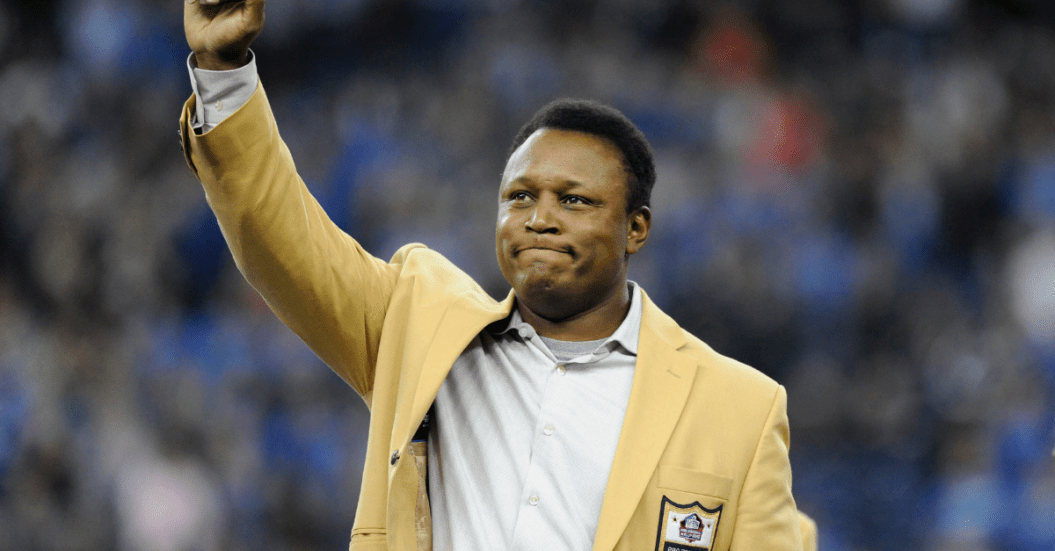One of the strangest occurrences in NFL history is the retirement of Barry Sanders. One of the greatest running backs and football players ever retired after just his 10th season, in the midst of his prime.
Videos by FanBuzz
Currently sitting at number four on the all-time rushing list in NFL history, the Hall-of-Fame back could have easily topped Walter Payton's record for NFL career rushing yards, but instead chose an early retirement.
Why Did Barry Sanders Retire?
He went this way.
No that way.@BarrySanders greatest career jukes! (@nflthrowback) pic.twitter.com/LPnh95QBLJ
— Detroit Lions (@Lions) May 31, 2019
When a player retires, it is usually due to injuries, age or struggling to find a spot on a roster. But Sanders was healthy, only 30 years old, and the best running back in the league. So why retire?
Sanders entered the league as possibly the most dominant running back in college football history. He played high school football in Wichita, Kansas, then played his college career at Oklahoma State wear he won the 1988 Heisman Trophy. But Sanders didn't exactly get the chance to play for a winner during his time with the Detroit Lions.
Since retiring, Sanders wrote co-authored a book — Barry Sanders: Now You See Him ... His Story in His Own Words — in which he made it pretty clear that he retired because he was losing interest in playing for a franchise that didn't put a winning team on the field.
Lions Playoff Struggles
Weekly reminder that @barrysanders is a bad man! pic.twitter.com/ZkHO63bWaq
— Detroit Lions (@Lions) March 20, 2019
In 10 seasons, Sanders and the Lions made the playoffs five times and had double-digit wins just three times. Of the five trips to the postseason, four of those ended in the Wild Card Round. The other time was in his third season when they reached the NFC Championship and were smoked by the Washington Redskins, 41-10.
As one of the best to ever play his position, to never get a chance to play in a Super Bowl has to be quite disheartening, plus he played in only one conference championship and was destroyed. Sanders' career record in playoff games was just 1-5.
And most may be confused as to why he wouldn't want to at least stick around and become the NFL's all-Time leading rusher, but Sanders just didn't care about that. He grew tired of chasing Sweetness' record.
In his book, Sanders tells the story about knowing he was retiring before the final game of the 1998 season. Sitting on the bench after another loss, Sanders realized his football career was over and began weeping.
Barry Sanders' Legacy
For me, it was @Tony_Dorsett https://t.co/abEzBkJE2s
— Barry Sanders (@BarrySanders) June 25, 2019
Sanders ended his career with 15,269 yards, going over 1,000 in each of his 10 seasons. His 1997 season was his best, rushing for 2,053 yards and 11 touchdowns. He is one of just seven players to go over 2,000 rushing yards in a season and was just the third to do it at the time. He ended up 52 yards shy of Eric Dickerson's single-season record.
The great 1997 season earned him the NFL Associated Press MVP, and his incredible career deserved a spot on the Pro Football Hall of Fame's 1990s All-Decade Team.
His final NFL season was his lowest rushing total of his last five years, but 1,491 yards is a great season for any running back, though he did only score four times. He made the Pro Bowl in every season of his career and was named First-Team All-Pro six times, including his first three years in the league.
Sanders didn't announce his retirement after the 1998 season, though. He actually waited until just before training camp of the 1999 season before sending a fax to a local reporter.
Biggest news day for #Lions since Barry Sanders sent that fax.
— Rod Beard (@detnewsRodBeard) November 5, 2015
Detroit Lions fans were upset and angered by his decision to hang up his cleats, but after missing the playoffs in two of his final three seasons, going 9-7 and losing in the 1997 Wild Card round to the Tampa Bay Buccaneers after rushing for over 2,000 yards, anyone should be able to accept his level of frustration with the front office and head coach Bobby Ross and Wayne Fontes.
Though he retired in the second spot for all-time leaders in rushing, the Dallas Cowboys' Emmitt Smith would eventually pass both him and Payton for the top spot in history.
It wasn't long after his retirement that he was enshrined in Canton as a Hall of Fame member with the Class of 2004.
The Detroit Lions had a similar situation unfold again when Calvin Johnson announced an early retirement, again as one of the best wide receivers in the league, hanging up his cleats at 30 years old like Sanders. Johnson did have some injury concerns, though.
It's one of the biggest "What If?" stories in NFL history, but let's not overlook how great Barry Sanders was for the 10 years he gave NFL fans.
This article was originally published June 28, 2019.


